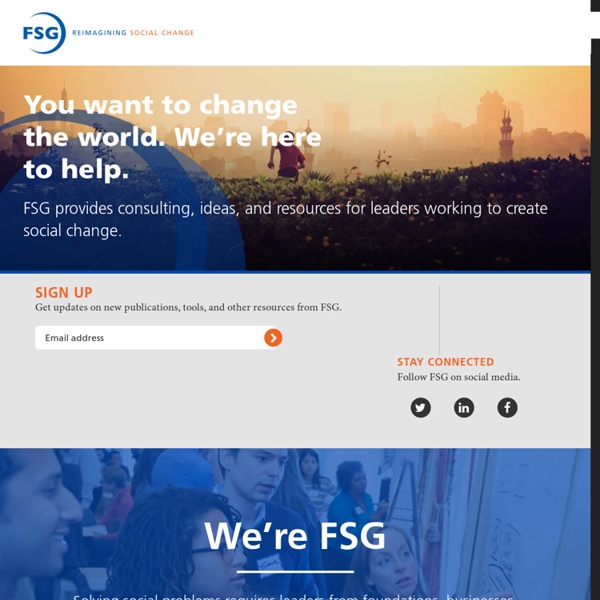



Creating shared value Creating shared value (CSV) is a business concept first introduced in Harvard Business Review article Strategy & Society: The Link between Competitive Advantage and Corporate Social Responsibility.[1] The concept was further expanded in the January 2011 follow-up piece entitled "Creating Shared Value: Redefining Capitalism and the Role of the Corporation in Society".[2] Written by Michael E. Porter, a leading authority on competitive strategy and head of the Institute for Strategy and Competitiveness at Harvard Business School, and Mark R. Kramer, Kennedy School at Harvard University and co-founder of FSG,[3] the article provides insights and relevant examples of companies that have developed deep links between their business strategies and corporate social responsibility (CSR). The central premise behind creating shared value is that the competitiveness of a company and the health of the communities around it are mutually dependent. Mechanism[edit] Academic Literature[edit]
La valeur partagée, un nouveau concept de Michael Porter Michael Porter, professeur de management à Harvard, voudrait que les entreprises prennent en main le management de leur responsabilité sociale, avec un nouveau concept : la shared value (valeur partagée). La RSE, une contrainte pour les entreprises Pour les libéraux purs et durs, la responsabilité sociale de l'entreprise (RSE) reste une obligation imposée par l'extérieur : la société civile, les médias, les dirigeants politiques. Michael Porter, professeur de management à Harvard et l'un des consultants les plus influents des Etats-Unis, si ce n'est du monde, avait montré il y a quelques années comment une grande firme pouvait intégrer cette RSE à sa stratégie[1]. Il va nettement plus loin, aujourd'hui, en lançant le concept de « shared value », de « valeur partagée ». Porter constate que le capitalisme est en crise, et que les entreprises sont perçues par beaucoup comme des entités égoïstes prospérant aux dépens de leur environnement naturel et humain. En savoir plus Marc Mousli Notes
La "shared value" aux sources d'une révolution entrepreneuriale Voilà qu'une analyse de Michael E. Porter et Mark R. Kramer – le premier s'étant notamment illustré avec ses travaux sur la façon dont une entreprise peut, en maîtrisant son environnement concurrentiel, obtenir un avantage compétitif ou encore sur la notion de pôle de compétence géographique ou cluster – vient de jeter un "pavé dans la mare" en revisitant quasiment le mythe fondateur de l'entreprise. L'article paru dans l'édition de janvier-février 2011 de Harvard Business Review et intitulé "Creating Shared Value" pourrait bien créer une rupture en lançant la réflexion sur cette nouvelle notion de l'entreprise. M. On pourrait à loisir et à plaisir dérouler la pensée de ces deux auteurs qui laissent entendre que l'entreprise aura ainsi demain une empreinte sociale : "Business must reconnect company success with social progress".
Using Story to Solve Social Problems How narrative intelligence can help everyone design solutions and generate useful data. Last week I was in a meeting with a dozen leaders of social agencies and enterprises, exploring options for a joint event in the coming year. Though the group was keen, we didn’t have a facilitator, and the conversation wandered. An hour later, we still hadn’t identified a goal for the event or even clarified why we wanted to do it. So I threw one of my favorite questions out to the table: “What would ‘happily ever after' look like to you if we made this happen?” The query drew several smiles—and brought the discussion into sharp focus. This idea of applying a story framework to strategic planning is a new-school take on old-school ways. An emerging concept, narrative intelligence is ill defined and unfamiliar to many. The basic idea is that we are exposed to information in story format from the time we are born.
Five cross-sector partnerships innovating to solve social problems | William D Eggers and Paul Macmillan | Public Leaders Network | Guardian Professional Despite the economic downturn, we've seen a massive growth of entrepreneurial activity targeted at solving larger social problems. A burgeoning new solution economy has emerged, where players from across the spectrum of business, government, philanthropy and social enterprise converge to solve big problems and, in the process, create tremendous public value and new wealth. The wavemakers who make the biggest impact think holistically about their role and their relation to other players – not as competitors fighting over an ever-shrinking pie, but as potential collaborators, who can share in the rewards of creating a new and larger concoction. Here are five of the more interesting examples: 1. 2. 3. 4. 5. These examples are but the tip of the iceberg. William D. • Want your say? To get our articles on policy and leadership direct to your inbox, sign up to the Guardian Public Leaders Network now. Looking for your next role?